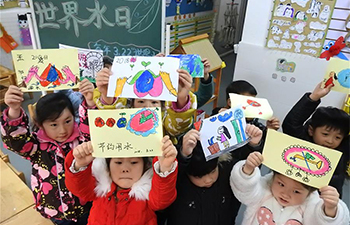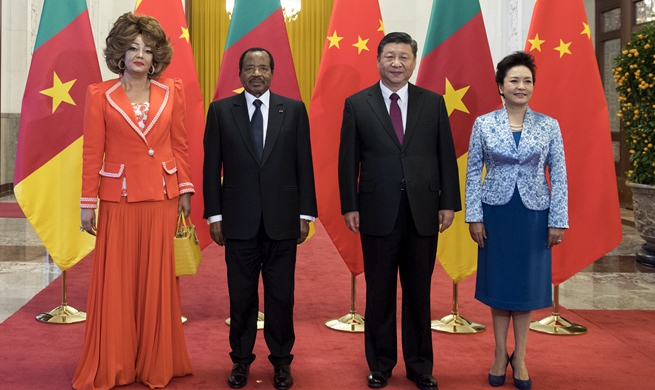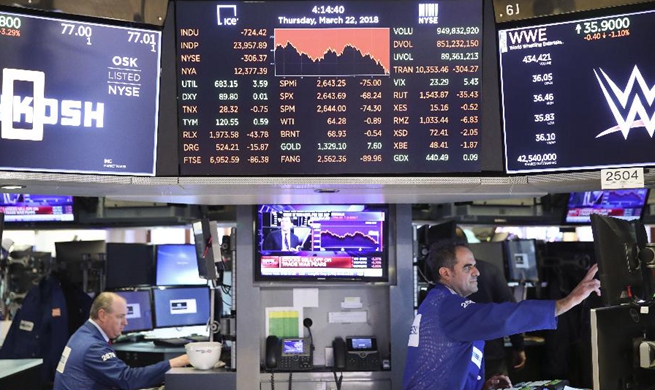by Xinhua writers Wang Ruoyao and Wang Pan
GUANGZHOU, March 23 (Xinhua) -- Chinese exporters are upset by a U.S. plan that could impose tariffs on up to 60 billion U.S. dollars of imports from China, calling the move irrational and destructive.
U.S. President Donald Trump on Thursday signed a memorandum on the plan in a unilateral move that triggered a market sell-off.
Trump has directed U.S. Trade Representative Robert Lighthizer to publish a list of proposed Chinese goods that could be subject to tariffs in 15 days, while the U.S. Treasury Department will have 60 days to propose restrictions on Chinese investment in the United States.
Some executives of Chinese companies told Xinhua that imposing tariffs might not drive U.S. orders out of China, but may instead cause a temporary shortage of certain commodities in the U.S. market, given that the world's largest economy is not omnipotent in manufacturing.
"It is just unbelievable. It will do no good to the United States," said a vice president of a leading Chinese TV set manufacturer, under condition of anonymity.
The company, based in south China's Guangdong Province, sold more than 4 million TV sets in the U.S. market in 2017.
The United States lacks a complete industrial chain for TV sets, and U.S. brands have their products manufactured in Asia, he said.
"The tariffs will lead to rising costs, which will probably be paid by U.S. consumers. The measure will harm the exporter without benefiting the importer."
An executive with Changhong, a home appliance manufacturer, said the move would force some small and medium-sized Chinese companies to halt sales in the United States.
"However, there are not many suppliers in some niche industries. The United States cannot easily find ideal alternatives in a short time," he said.
"If subject to the tariffs, we will hike prices, and tell U.S. customers that they have to pay more because of their president's tariff decision," said a foreign business chief with a Guangdong-based home appliance company.
The manufacturer exports products worth around 10 million U.S. dollars to the United States a year, both online and offline, accounting for 9 percent of its export volume.
Qi Tonggang, chairman of Qirun, a high-end equipment manufacturer based in east China's Zhejiang Province, worries his company will bear the brunt of the potential tariffs.
Qirun was in talks with a U.S. investment company that was considering selling the former's moisture separator reheater, a device that removes moisture from wet steam and reheats the steam, to Europe.
"I fear the cooperation will fail. I fear the products we have poured so much money into cannot find a buyer," Qi said.
The trade dispute may deal a hard blow to privately owned Chinese high-tech companies, which have not gained a firm foothold in the domestic market while being shackled in the overseas market, Qi said.
The executives said some U.S. companies have retreated or will recall their orders from China. However, the attempt to accelerate the process with a massive imposition of tariffs against China will only cause chaos and losses, they said.
"'Made in China' is too big to be replaced by one region," said Lin Yiqing, chairman of Qiloo, an east China company that exports shoes to the United States.
Lin estimated that at least a third of shoes sold in the United States would still come from China, because other manufacturers cannot provide more.
"Therefore, U.S. retailers and customers will be victims of the tariff plan," said Lin.
In a statement on potential tariffs against China in mid-March, U.S. Chamber President and CEO Thomas J. Donohue said, "As we're starting to see, tariffs could lead to a destructive trade war with serious consequences for U.S. economic growth and job creation. The livelihood of America's consumers, businesses, farmers, and ranchers are at risk if the administration proceeds with this plan."
The U.S. memorandum is based on a Section 301 investigation into alleged Chinese intellectual property and technology transfer practices that was launched by the Trump administration in August 2017.
"We firmly oppose it. It is a typical unilateral and protectionist practice," said a spokesperson with China's Ministry of Commerce (MOC).
The spokesperson also reiterated China's stance of not wanting or fearing any trade wars. "We have confidence and capability in dealing with any challenges," he added.
The MOC urged the United States to "pause on the brink of a precipice" and make prudent decisions so as not to put bilateral trade relations in jeopardy.
"It is true that we are Chinese companies, but we supply American companies," said the executive with Changhong.
"We hope the United States keeps calm about China's development, which can benefit itself as well," he said.

















